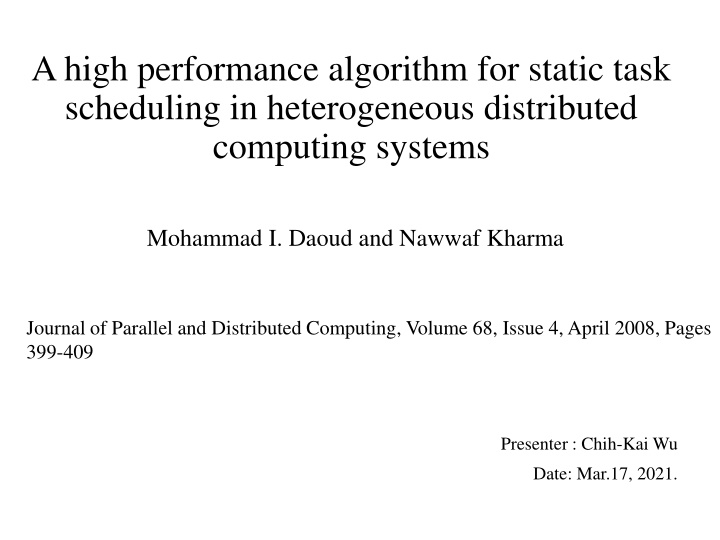
Efficient Algorithm for Task Scheduling in Distributed Computing Systems
Enhance the performance of task scheduling in heterogeneous distributed computing systems with the Longest Dynamic Critical Path (LDCP) algorithm. This innovative approach considers processor heterogeneity and communication overhead, outperforming existing algorithms like HEFT and DLS. Discover how LDCP optimizes task scheduling for high communication costs, providing a practical solution for parallel applications in heterogeneous environments.
Download Presentation

Please find below an Image/Link to download the presentation.
The content on the website is provided AS IS for your information and personal use only. It may not be sold, licensed, or shared on other websites without obtaining consent from the author. If you encounter any issues during the download, it is possible that the publisher has removed the file from their server.
You are allowed to download the files provided on this website for personal or commercial use, subject to the condition that they are used lawfully. All files are the property of their respective owners.
The content on the website is provided AS IS for your information and personal use only. It may not be sold, licensed, or shared on other websites without obtaining consent from the author.
E N D
Presentation Transcript
A high performance algorithm for static task scheduling in heterogeneous distributed computing systems Mohammad I. Daoud and Nawwaf Kharma Journal of Parallel and Distributed Computing, Volume 68, Issue 4, April 2008, Pages 399-409 Presenter: Chih-Kai Wu Date: Mar.17, 2021.
Abstract(1/2) Effective task scheduling is essential for obtaining high performance in heterogeneous distributed computing systems (HeDCSs). However, finding an effective task schedule in HeDCSs requires the consideration of both the heterogeneity of processors and high interprocessor communication overhead, which results from non-trivial data movement between tasks scheduled on different processors. In this paper, we present a new high-performance scheduling algorithm, called the longest dynamic critical path (LDCP) algorithm, for HeDCSs with a bounded number of processors. The LDCP algorithm is a list-based scheduling algorithm that uses a new attribute to efficiently select tasks for scheduling in HeDCSs.
Abstract(2/2) The efficient selection of tasks enables the LDCP algorithm to generate high-quality task schedules in a heterogeneous computing environment. The performance of the LDCP algorithm is compared to two of the best existing scheduling algorithms for HeDCSs: the HEFT and DLS algorithms. The comparison study shows that the LDCP algorithm outperforms the HEFT and DLS algorithms in terms of schedule length and speedup. Moreover, the improvement in performance obtained by the LDCP algorithm over the HEFT and DLS algorithms increases as the inter-task communication cost increases. Therefore, the LDCP algorithm provides a practical solution for scheduling parallel applications with high communication costs in HeDCSs.
Task priorities 25 27 21 28
Task processor t1 P0 t0 P1 t3 P1 t8 P0 LDCP 0-3-8-10 T0=78 T3=67 T8=42.5 T10=13.5
Task processor t1 P0 t0 P1 t3 P1 t8 P0 t4 P0 LDCP 4-9 T4=38 T9=9
Task processor t1 P0 t0 P1 t3 P1 t8 P0 t4 P0 t6 P1 LDCP 6-10 T6=35.5 T10=13.5
Task processor t1 P0 t0 P1 t3 P1 t8 P0 t4 P0 t6 P1 t2 P0 LDCP 2-9 T2=34 T9=9
Task processor t1 P0 t0 P1 t3 P1 t8 P0 t4 P0 t6 P1 t2 P0 t5 P1 LDCP 5-9 T5=20.5 T9=9
Task processor t1 P0 t0 P1 t3 P1 t8 P0 t4 P0 t6 P1 t2 P0 t5 P1 t7 P0 LDCP 7-9 T7=13 T9=6 t9 P0
Task processor t1 P0 t0 P1 t3 P1 t8 P0 t4 P0 t6 P1 t2 P0 t5 P1 t7 P0 t9 P0 t10 P0 makespan=64
